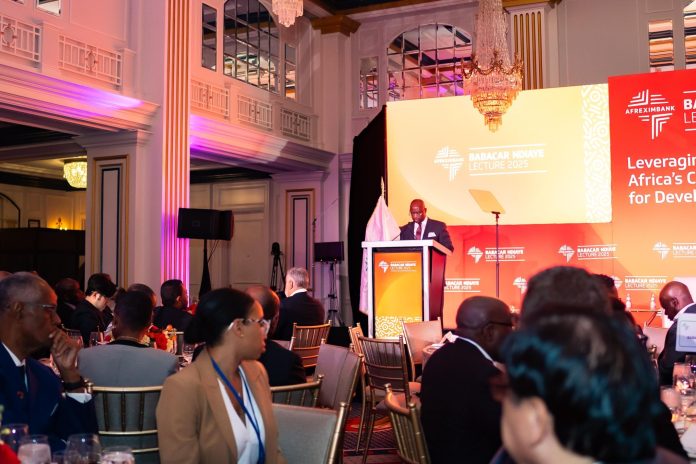Abidjan, Côte d’Ivoire – October 2025 — “Africa’s future depends on institutions built by Africans, financed with African resources, and led by African people.”
With these powerful words, Dr. George Elombi, Executive Vice President and Incoming President of the African Export-Import Bank (Afreximbank), set the tone for the Babacar Ndiaye Annual Lecture, reaffirming the continent’s collective commitment to financial sovereignty, institutional resilience, and sustainable development.
Delivering his welcome address under the theme “Leveraging Global Africa’s Capital for Development: The Imperative for Stronger African Financial Institutions,” Dr. Elombi emphasized that Africa’s long-term prosperity rests on its ability to mobilize domestic capital, deepen financial integration, and build robust institutions capable of withstanding global shocks.
He paid glowing tribute to Dr. Babacar Ndiaye, the late former President of the African Development Bank (AfDB), describing him as a visionary who championed African-built and African-led institutions as the foundation of true economic independence. That legacy, Dr. Elombi noted, continues to thrive through organizations such as Afreximbank and Shelter Afrique, both of which exemplify Africa’s capacity for self-reliance and structural innovation.
Highlighting Afreximbank’s transformative role in advancing the continent’s development agenda, Dr. Elombi revealed that the Bank has disbursed over US$155 billion over the past decade. These funds have supported trade corridors, industrial expansion, and groundbreaking initiatives such as the Pan-African Payment and Settlement System (PAPSS) and the AfCFTA Adjustment Fund, both designed to strengthen intra-African trade and enhance economic self-sufficiency.
Addressing global perceptions of Africa as a “high-risk” investment destination, Dr. Elombi challenged this outdated narrative with data that reflects Africa’s growing creditworthiness, fiscal discipline, and resilience. He asserted that the true obstacle to fair access to global capital is not performance, but perception — a misconception that must be dismantled to secure equitable financial engagement for African economies.
As global economic conditions continue to evolve, Dr. Elombi called for a renewed and coordinated effort to reinforce Africa’s financial sovereignty. This, he said, requires strengthening African financial institutions, safeguarding Preferred Creditor Status, and accelerating the establishment of critical continental bodies such as the African Monetary Fund, the African Investment Bank, and the African Central Bank — institutions envisioned to anchor Africa’s monetary stability and economic integration.
He concluded with a stirring message of self-determination, reminding the audience that Africa’s destiny will not be dictated by external benevolence but shaped by unity of purpose, institutional strength, and the strategic mobilization of the continent’s own capital.
“Africa’s story,” Dr. Elombi declared, “will be written not by those who doubt its capacity, but by those who dare to build its future with African hands, African minds, and African resources.”




